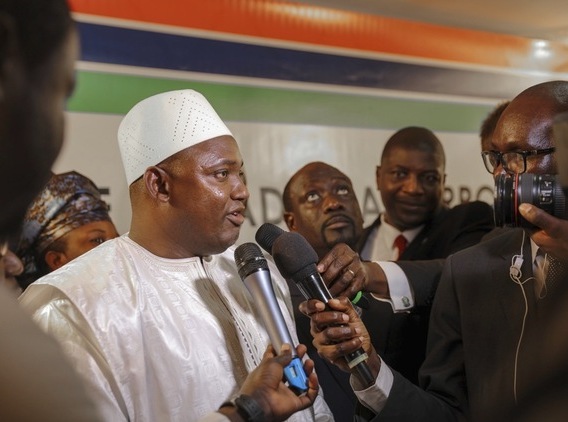Gambia’s President-elect says Jammeh leaving soon for Guinea

Gambia’s defeated leader Yahya Jammeh is expected to leave soon for Guinea, and the new president said Saturday he plans to return home to take power once the situation is “clear.”
A visibly tired Adama Barrow told The Associated Press in an interview Saturday that he will enter Gambia once a security sweep has been completed. He has been in neighboring Senegal for his safety during a political standoff that came to the brink of a regional military intervention.
Barrow, who won December’s presidential elections, spoke just hours after Jammeh announced he would relinquish power, ending hours of last-minute negotiations with the leaders of Guinea and Mauritania.
“It is not yet confirmed information, but reliable sources say he’ll be leaving today,” Barrow told the AP. “We believe he’ll go to Guinea, but we are yet to confirm 100 percent, but that’s what we believe.”
In the Guinean capital, Conakry, the security minister was at the airport with jeeps full of well-armed military personnel, witnesses said. However, a special plane also landed from Malabo, the capital of Equatorial Guinea, with only a crew and no passengers, suggesting that could be Jammeh’s final destination. Equatorial Guinea, unlike Guinea, is not a state party to the International Criminal Court.
The new Gambian president said he had not yet been given the communique that should spell out the terms of Jammeh’s departure. “What is fundamental here is he will live in a foreign country as of now,” he said.
Under heavy security, Barrow took the presidential oath of office Thursday at Gambia’s embassy in Senegal, with the backing of the international community.
As Jammeh prepared to leave the country after more than 22 years in power, human rights activists demanded that he be held accountable for alleged abuses, including torture and detention of opponents.
It was those concerns about prosecution that led the famously mercurial Jammeh to challenge the December election results, just days after shocking Gambians by conceding his loss to Barrow.
Jammeh once vowed to rule for a billion years. His agreement to step down has brought an end to the political crisis in this tiny West African nation of 1.9 million, which has promoted itself to European tourists as “the Smiling Coast of Africa.”
Critics of Jammeh insisted he should not be given any kind of amnesty.
“Jammeh came as a pauper bearing guns. He should leave as a disrobed despot. The properties he seeks to protect belong to Gambians and Gambia, and he must not be allowed to take them with him. He must leave our country without conditionalities,” said Jeggan Bahoum of the Movement for the Restoration of Democracy in Gambia.
An online petition urged that Jammeh not be granted asylum and should instead be arrested. Barrow, though, cautioned that was premature.
“We aren’t talking about prosecution here, we are talking about getting a truth and reconciliation commission,” Barrow told the AP. “Before you can act, you have to get the truth, to get the facts together.”
Jammeh, who first seized power in a 1994 coup, has been holed up this week in his official residence in Banjul, increasingly isolated as he was abandoned by his security forces and several Cabinet members.
The West African regional bloc, ECOWAS, pledged to remove Jammeh by force if he did not step down. The group assembled a multinational military force including tanks that rolled into Gambia on Thursday. The force moved in after Barrow’s inauguration and a unanimous vote by the U.N. Security Council supporting the regional efforts.
Jammeh’s announcement to relinquish power is a good first step, said Jeffrey Smith, executive director of Vanguard Africa.
“For the Gambia to truly move on, President Barrow must reside in State House and begin the task of governing. In an ideal scenario, Jammeh will also face justice for the many crimes he has committed since 1994,” Smith wrote by email.
Fearing violence as the political crisis dragged on, about 45,000 people have fled Gambia for Senegal, according to the U.N. refugee agency.
After days of uncertainty, Banjul was peaceful Saturday. At the ferry terminal, Yassin Jallow helped hand out bread to families returning to the capital.
“There are so many people who couldn’t go out, and nothing is working, the shops are closed, the bakeries are closed … and we don’t want anyone to starve,” Jallow said.
Some wary Gambians said they would believe Jammeh’s departure when they saw it.
“I heard he will step down. But leaving? That is the question,” said student Haruna Jallow.












0 Comments